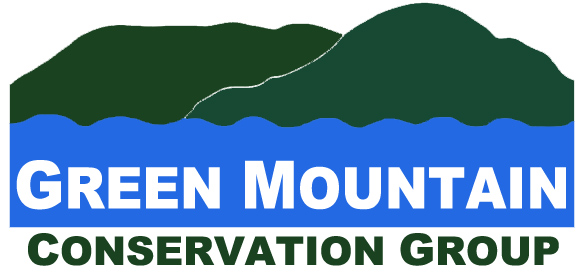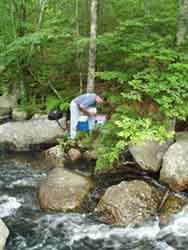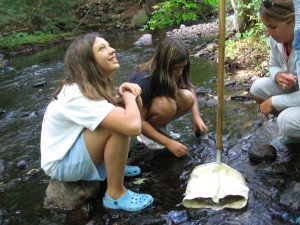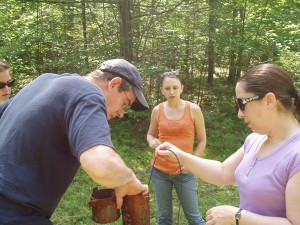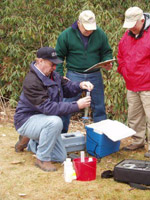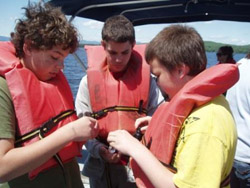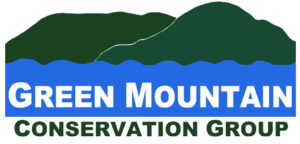Water Quality Monitoring Program
History
The Saco/Ossipee Watershed Water Quality Monitoring Program presents a joint commitment by GMCG and the Saco River Corridor Commission (SRCC) of Maine to protect the entirety of the Saco Watershed across 2 states, 26 towns.
The program began 2001 with the completion of the Natural Resource Inventory mapping project, and was developed with project partners: NH DES, SRCC, Chocorua Lake Association, UNH, and the six Watershed towns: Effingham, Freedom, Ossipee, Madison, Sandwich and Tamworth.
The program has grown substantially since 2001. In 2010, over 600 volunteers, including students, helped monitor water quality throughout the watershed and participated in water protection activities. Altogether, over 4,000 volunteer hours were logged worth an estimated $85,000. Local town contributions, the University of New Hampshire lab assistance and in kind donation of lab support, and donations from GMCG members and businesses also help make these programs possible each year.
Each year, the Water Quality Monitoring Program accomplishes the following:
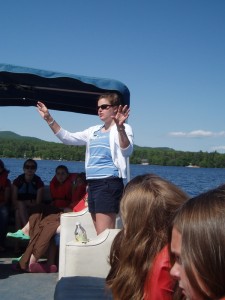
Water Monitoring Intern Molly Newton teaches campers about Ossipee Lake, local geology, water quality and pollution.
-
- Approximately 30 local volunteers help monitor 19 river sites from April through October for the Regional Interstate Volunteers for the Ecosystems and Rivers of the Saco (RIVERS) monitoring program. 9 additional sites are monitored monthly through the winter.
- 6 local summer camps on Lake Ossipee take part in lake and tributary monitoring for the Volunteer Lake Assessment Program (VLAP) and Ossipee Lake and Tributaries program (OLT), including: Camp Huckins, Camp Calumet, Camp Cody, Danforth Bay Camping Resort, Camp Marist and Camp Robin Hood.
- During the fall, a combination of 5 local schools and 15 volunteers create a group 100+ strong to conduct biological sampling of 10 river sites through the Volunteer Biological Assessment Program (VBAP) in partnership with the NH Department of Environmental Services (NH DES).
- A comprehensive review of the monitoring program, data and final report is completed.
- Data is submitted to the NH DES Environmental Monitoring Database (EMD) for inclusion in the statewide assessment of surface water quality, per the EPA’s Clean Water Act.
- Presentations are given to Watershed towns on water quality conditions for sites monitored for these various programs throughout the year.
- Reports are given to towns each year of the previous year’s data.
Other Water Quality & Research Projects
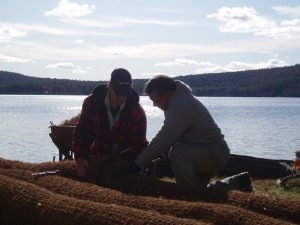 In 2009, GMCG completed its first Best Management Practices (BMP) demonstration project on Province Lake in partnership with NH DES, Acton Wakefields Watershed Alliance, and the Effingham Conservation Commission. The project will help a landowner prevent further erosion of the shoreline using coir logs (coconut husk logs), live staking, plantings, and filtration steps. Since then, GMCG has helped with two additional shoreline protection projects on Duncan Lake in Ossipee and Ossipee Lake in Freedom.
In 2009, GMCG completed its first Best Management Practices (BMP) demonstration project on Province Lake in partnership with NH DES, Acton Wakefields Watershed Alliance, and the Effingham Conservation Commission. The project will help a landowner prevent further erosion of the shoreline using coir logs (coconut husk logs), live staking, plantings, and filtration steps. Since then, GMCG has helped with two additional shoreline protection projects on Duncan Lake in Ossipee and Ossipee Lake in Freedom.
Also in 2009, GMCG partnered with Dr. Newton and the Smith College Department of Geosciences on a groundwater monitoring pilot program, sampling 60 wells across the Watershed for 18 different parameters. This was made possible by a grant from the NH Moose Plate Program.
Water Quality Monitoring 2011
The Water Quality Monitoring Program for 2013 will provide the twelfth year of data on the health of the watershed. Forty five sites throughout six towns will be sampled over the course of the year with the help of many volunteers, campers, students and partner organizations. The Rt. 25 Pine River Boat launch will again be staffed by Lake Hosts in an effort to prevent the spread of invasive plant species throughout the Watershed. The data gathered this year will be added to the previous eleven years of data, creating an invaluable record of the health of the Watershed. GMCG will also be updating the Quality Assurance Project Plan (QAPP) with the Saco River Corridor Commission, NH DES, Maine DEP and EPA. The QAPP ensures the integrity of the monitoring programs’ protocols and data.
As education of the public is one of the most important goals of GMCG, over the course of the summer season,
GMCG partners with the camps of Ossipee Lake to teach campers about the anatomy of a watershed, geology of the local area, and the importance of water quality. Campers assist with data collection, learning the basics of what makes a watershed clean and healthy. Over 200 children participate in water quality monitoring and education programs through this partnership of GMCG with local camps.
Educational programs will continue into the fall, as local elementary school students assist GMCG with sampling of macroinvertebrate populations in local rivers and streams. Macroinvertebrates, or organisms without a backbone that are visible to the naked eye, provide an accurate measure of the health of the water body as many species are extremely sensitive to pollution. The presence (or lack thereof) of macroinvertebrates is an excellent indicator of the health of the water body.
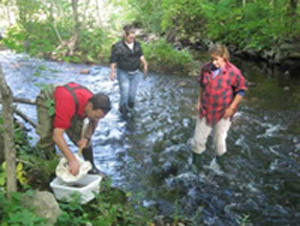
NH DES and GMCG staff work with schools and volunteers each year through the Volunteer Biological Assessment Program.
We also want to share the Preliminary report on the GMCG Water Quality Data with you as well as the 10 Year Data Presentation from Michelle Daley’s student at UNH, Melissa Cripps.
The report has some wonderful graphs of the GMCG data and sets a good stage for the start of putting together our 10 year report on Water Quality Data that we will give to municipal officials. GMCG’s Water Quality Coordinator will be working on this report with both our partners at UNH (Michelle Daley and Bob Craycraft) and Forrest Bell as he will be interpreting the data in preparation for the Watershed Management Plan.
The Research Committee will also help with formatting this report so we can put it all together in a way that can not only be read by municipal officials but can help guide planning boards in looking at development proposals as we enter our second decade of water quality monitoring.
We also plan to include information on our macro program and data collection that we do with schools, a bit about well water and information on our connection with our downstream neighbors, the Saco River Corridor Commission in Maine.
GMCG’s Water Quality Coordinator will be reaching out to folks in the future who might be interested in being on a committee to help craft this Report and help present it to the Community, so please stay tuned and direct any comments or suggestions their way!
Thanks so much to Michelle and Bob for the continued support and help with GMCG’s Water Quality program!
VOLUNTEERS MAKE THIS PROGRAM SUCCESSFUL!
CONTACT US: info@gmcg.org
